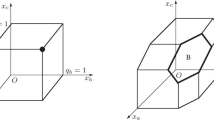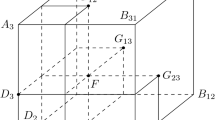Abstract
We consider reallocation problems in settings where the initial endowment of each agent consists of a subset of the resources. The private information of the players is their value for every possible subset of the resources. The goal is to redistribute resources among agents to maximize efficiency. Monetary transfers are allowed, but participation is voluntary. We develop incentive-compatible, individually-rational and budget-balanced mechanisms for two settings in which agents have complex multi-parameter valuations, both settings include double auctions as a special case. The first setting is combinatorial exchanges, where we provide a mechanism that achieves a logarithmic approximation to the optimal efficiency when valuations are subadditive. The second setting is Arrow–Debreu markets for a single divisible good, where we present a constant approximation mechanism. The first result is given for a Bayesian setting, where the latter result is for prior-free environments.
Similar content being viewed by others
Notes
In fact, using noisy estimations of the medians decreases the performance of our mechanism in a rate proportional to the noise. Hence, even if we only have a black box access to the distributions, we can use the black box to estimate the medians within an arbitrary precision, and preserve very similar performance guarantees.
A valuation v is subadditive if for ever two bundles S and T we have that \(v(S)+v(T)\ge v(S\cup T)\).
If the optimal welfare is smaller than \(H_n\cdot r\), then the mechanism is not required to allocate the items, but if it does so, the revenue is guaranteed to be at least r.
Our general model allows limitations on the endowments, for example, we may impose a size limit. Our main result for combinatorial exchanges does not impose limits on the allowed endowments, while our result for Arrow–Debreu markets assumes that the endowments are not too large.
Note that this definition holds for every realization of v, i.e., ex post (and not only in expectation, which is usually a key for achieving budget balance in Bayesian domains, e.g., in [15]).
The items are produced only if a sale is made. Here we assume for simplicity that the cost of producing the first item is r and the cost of producing any additional item is 0. This corresponds to the case that the production cost of items is governed by the start-up cost. A more realistic setup assumes a production cost for each item, or more generally for bundles of items. Indeed, the mechanism of Sect. 3.2 essentially provides a solution for this case.
XOS is a subclass of subadditive valuations that includes all submodular valuations, see [30].
When \(v_i(\cdot )\) is twice differentiable, we simply assume that \(v_i^{\prime \prime }(x) \le 0\) for every x.
To accomplish that, greedily add agents to \(N_1\) while the sum of the \(r_i\)’s of agents in \(N_1\) is at least \(\frac{1}{4}\). Stop adding agents to \(N_1\) when we add an agent that makes an “overflow”: \(\Sigma _{i\in N_1}r_i> \frac{1}{4}\). Since each \(r_i\le \frac{1}{8}\), we also have that \(\Sigma _{i\in N_1}r_i\le \frac{3}{8}\). Continue similarly, only with agents that were not added to \(N_1\), to construct \(N_2\) and \(N_3\).
Formally, order the buyers arbitrarily, and let \(x_i=\max \{0,\frac{1}{8} - \Sigma _{i'>i}x'_{i'}\}\) if \(x'_i+\Sigma _{i'>i}x'_{i'}\ge \frac{1}{8}\) (otherwise, \(x_i=x'_i\)).
To see this, note that the derivative of \(x\cdot p\) is p for every x. Since \(x_i^{\prime }\) maximizes profit, and since \(v_i\) satisfies the decreasing marginals property, for every value \(x<x_i^{\prime }\) the derivative of \(v_i(r_i-x)\) is negative with absolute value of at most p. Therefore, the marginal profit is non-negative for \(x<x_i^{\prime }\). A similar argument holds also when \(v_i\) is not differentiable.
References
Akerlof, G.A.: The market for ‘lemons’: quality uncertainty and the market mechanism. Q. J. Econ. 84(3), 488–500 (1970)
Arrow, K.J., Debreu, G.: Existence of an equilibrium for a competitive economy. Econometrica 22(3), 265–290 (1954)
Ausubel, L., Levin, J., Milgrom, P., Segal, I.: Incentive auction rules option and discussion. Appendix to the FCC’s (28-Sep-2012) NPRM on Incentive Auctions (2013)
Babaioff, M., Briest, P., Krysta, P.: On the approximability of combinatorial exchange problems. In: SAGT, pp. 83–94 (2008)
Blumrosen, L., Dobzinski, S.: Reallocation mechanisms. In: Proceedings of the Fifteenth ACM Conference on Economics and Computation. Full version in arXiv:1404.6786, EC’14, p. 617 (2014)
Blumrosen, L., Mizrahi, Y.: Approximating gains-from-trade in bilateral trading. In: Web and Internet Economics WINE, pp. 400–413 (2016)
Blumrosen, L., Dobzinski, S.: (Almost) efficient mechanisms for bilateral trading. Games Econom. Behav. 130, 369–383 (2021)
Braun, A., Kesselheim, T.: Truthful mechanisms for two-sided markets via prophet inequalities. In: Proceedings of the 22nd ACM Conference on Economics and Computation (2021)
Brustle, J., Cai, Y., Wu, F., Zhao, M.: Approximating gains from trade in two-sided markets via simple mechanisms. In: Proceedings of the 2017 ACM Conference on Economics and Computation, EC’17, pp. 589–590 (2017)
Cesa-Bianchi, N., Cesari, T., Colomboni, R., Fusco, F., Leonardi, S.: A regret analysis of bilateral trade. In: Proceedings of the 22nd ACM Conference on Economics and Computation (2021)
Colini-Baldeschi, R., de Keijzer, B., Leonardi, S., Turchetta, S.: Approximately efficient double auctions with strong budget balance. In: SODA 2016 (2016)
Colini-Baldeschi, R., Goldberg, P.W., de Keijzer, B., Leonardi, S., Roughgarden, T., Turchetta, S.: Approximately efficient two-sided combinatorial auctions. In: The ACM Conference on Economics and Computation, pp. 591–608 (2017)
Colini-Baldeschi, R., Goldberg, P.W., de Keijzer, B., Leonardi, S., Turchetta, S.: Fixed price approximability of the optimal gain from trade. In: Web and Internet Economics—WINE, pp. 146–160 (2017)
Colini-Baldeschi, R., Goldberg, P.W., de Keijzer, B., Leonardi, S., Roughgarden, T., Turchetta, S.: Approximately efficient two-sided combinatorial auctions. In: ACM Transactions on Economics and Computation (TEAC). Also appeared in EC’17, vol. 8, pp. 1 – 29 (2020)
Cramton, P., Gibbons, R., Klemperer, P.: Dissolving a partnership efficiently. Econometrica 55(3), 615–32 (1987)
Cripps, M.W., Swinkels, J.M.: Efficiency of large double auctions. Econometrica 74(1), 47–92 (2006)
Dobzinski, S.: An impossibility result for truthful combinatorial auctions with submodular valuations. In: Proceedings of the 43rd Annual ACM Symposium on Theory of Computing, STOC ’11, pp. 139–148 (2011)
Dobzinski, S.: Computational efficiency requires simple taxation. In: IEEE 57th Annual Symposium on Foundations of Computer Science, FOCS 2016, 9–11 October 2016, Hyatt Regency, New Brunswick, New Jersey, USA, pp. 209–218 (2016)
Dobzinski, S., Ovadia, S.: Combinatorial cost sharing. In: Proceedings of the 2017 ACM Conference on Economics and Computation, pp. 387–404. ACM (2017)
Dobzinski, S., Vondrák, J.: The computational complexity of truthfulness in combinatorial auctions. In: ACM Conference on Electronic Commerce, pp. 405–422 (2012)
Dughmi, S., Vondrák, J.: Limitations of randomized mechanisms for combinatorial auctions. In: FOCS, pp. 502–511 (2011)
Dutting, P., Roughgarden, T., Talgam-Cohen, I.: Modularity and greed in double auctions. In: EC’14
Feige, U.: On maximizing welfare where the utility functions are subadditive. In: 38th ACM Symposium on Theory of Computing, pp. 41–50 (2006)
Fudenberg, D., Mobius, M., Szeidl, A.: Existence of equilibrium in large double auctions. J. Econ. Theory 133(1), 550–567 (2007)
Gerstgrasser, M., Goldberg, P.W., de Keijzer, B., Lazos, P., Skopalik, A.: Multi-unit bilateral trade. In: The Thirty-Third AAAI Conference on Artificial Intelligence, AAAI 2019, pp. 1973–1980 (2019)
Hagerty, K.M., Rogerson, W.P.: Robust trading mechanisms. J. Econ. Theory 42(1), 94–107 (1987)
Kang, Z.Y., Vondrak, J.: Fixed-price approximations to optimal efficiency in bilateral trade. Stanford University, Manuscript (2019)
Kang, Z.Y., Pernice, F., Vondrák, J.: Fixed-price approximations in bilateral trade. In: Proceedings of the 2022 ACM-SIAM Symposium on Discrete Algorithms, SODA 2022, pp. 2964–2985 (2022)
Kothari, A., Sandholm, T., Suri, S.: Solving combinatorial exchanges: optimality via a few partial bids. In: Proceedings of the Third International Joint Conference on Autonomous Agents and Multiagent Systems 2004, pp. 1418–1419 (2004)
Lehmann, B., Lehmann, D., Nisan, N.: Combinatorial auctions with decreasing marginal utilities. Games Econ. Behav. (A preliminary version appeared in EC’01) 55(2), 270–296 (2006)
Liu, Z., Ren, Z., Wang, Z.: Improved approximation ratios of fixed-price mechanisms in bilateral trades. In: Proceedings of the 55th Annual ACM Symposium on Theory of Computing (2023)
McAfee, P.R.: The gains from trade under fixed price mechanisms. Appl. Econ. Res. Bull. 1 (2008)
Milgrom, P., Segal, I.: Deferred-acceptance heuristic auctions. Working paper, Stanford University (2013)
Moulin, H.: Incremental cost sharing: characterization by coalition strategy-proofness. Soc. Choice Welf. 16(2), 279–320 (1999)
Myerson, R.B., Satterthwaite, M.A.: Efficient mechanisms for bilateral trading. J. Econ. Theory 28, 265–281 (1983)
Nisan, N.: In Noam Nisan, Tim Roughgarden, Eva Tardos and Vijay Vazirani (Editors), Algorithmic Game Theory. Chapter 9. Introduction to Mechanism Design (for Computer Scientists). Cambridge University Press (2007)
Roughgarden, T., Sundararajan, M.: New trade-offs in cost-sharing mechanisms. In: STOC, pp. 79–88 (2006)
Rustichini, A., Satterthwaite, M.A., Williams, S.R.: Convergence to efficiency in a simple market with incomplete information. Econometrica 62(5), 1041–63 (1994)
Satterthwaite, M.A., Williams, S.R.: The optimality of a simple market mechanism. Econometrica 70(5), 1841–1863 (2002)
Segal-Halevi, E., Hassidim, A., Aumann, Y.: SBBA: A strongly-budget-balanced double-auction mechanism. In: the 9th International Symposium on Algorithmic Game Theory, pp. 260–272 (2016)
Acknowledgements
The first author was supported by Israel Science Foundation grants number 2570/19 and by the Asper center at the Hebrew University Business School. The second author supported by the U.S.-Israel Binational Science Foundation grant number 2016192 and Israel Science Foundation grant number 2185/19.
Author information
Authors and Affiliations
Contributions
L.B. and S.D. wrote the whole paper together.
Corresponding author
Ethics declarations
Conflict of interest
The authors declare no competing interests.
Additional information
Publisher's Note
Springer Nature remains neutral with regard to jurisdictional claims in published maps and institutional affiliations.
A preliminary version of the results in this paper was presented in ACM EC 2014 under the title “Reallocation Mechanisms” and appeared in a 1-page abstract [5].
Rights and permissions
Springer Nature or its licensor (e.g. a society or other partner) holds exclusive rights to this article under a publishing agreement with the author(s) or other rightsholder(s); author self-archiving of the accepted manuscript version of this article is solely governed by the terms of such publishing agreement and applicable law.
About this article
Cite this article
Blumrosen, L., Dobzinski, S. Combinatorial Reallocation Mechanisms. Algorithmica 86, 1246–1262 (2024). https://doi.org/10.1007/s00453-023-01191-3
Received:
Accepted:
Published:
Issue Date:
DOI: https://doi.org/10.1007/s00453-023-01191-3




